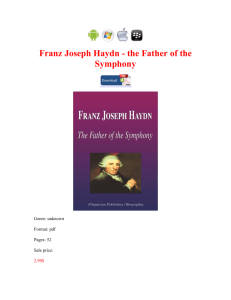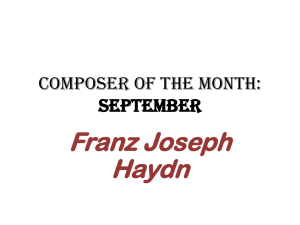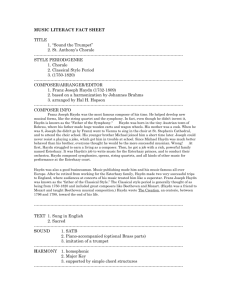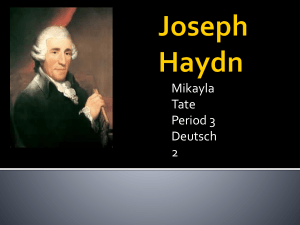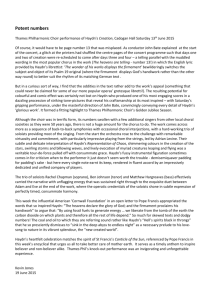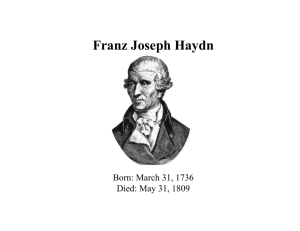achieved-is-the
advertisement
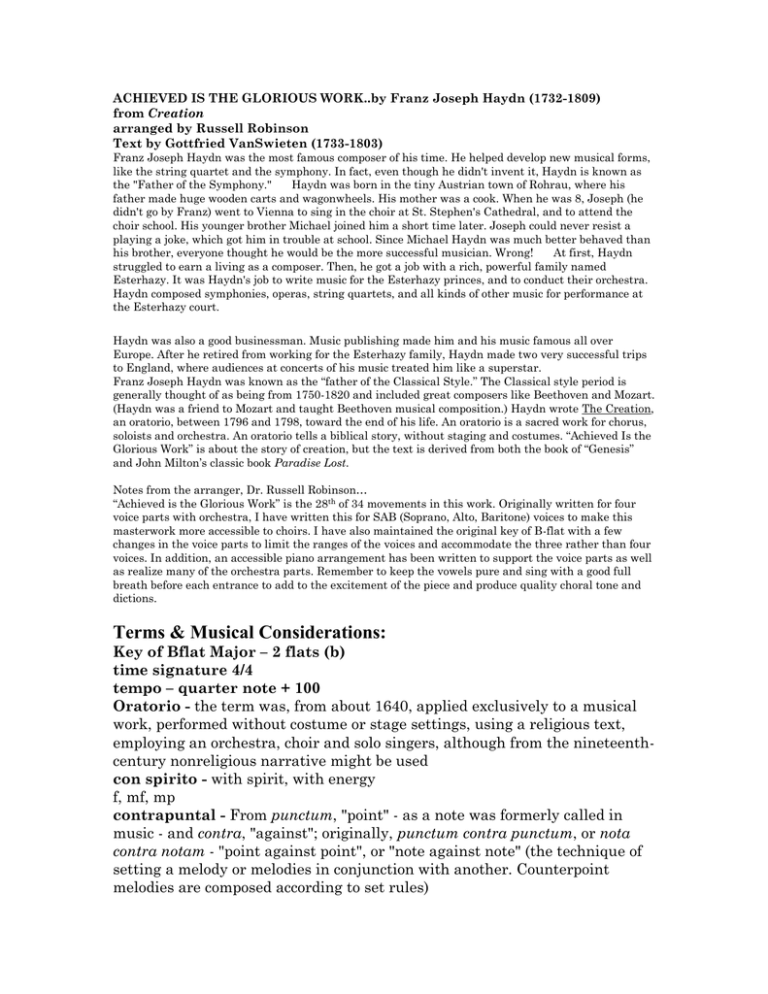
ACHIEVED IS THE GLORIOUS WORK..by Franz Joseph Haydn (1732-1809) from Creation arranged by Russell Robinson Text by Gottfried VanSwieten (1733-1803) Franz Joseph Haydn was the most famous composer of his time. He helped develop new musical forms, like the string quartet and the symphony. In fact, even though he didn't invent it, Haydn is known as the "Father of the Symphony." Haydn was born in the tiny Austrian town of Rohrau, where his father made huge wooden carts and wagonwheels. His mother was a cook. When he was 8, Joseph (he didn't go by Franz) went to Vienna to sing in the choir at St. Stephen's Cathedral, and to attend the choir school. His younger brother Michael joined him a short time later. Joseph could never resist a playing a joke, which got him in trouble at school. Since Michael Haydn was much better behaved than his brother, everyone thought he would be the more successful musician. Wrong! At first, Haydn struggled to earn a living as a composer. Then, he got a job with a rich, powerful family named Esterhazy. It was Haydn's job to write music for the Esterhazy princes, and to conduct their orchestra. Haydn composed symphonies, operas, string quartets, and all kinds of other music for performance at the Esterhazy court. Haydn was also a good businessman. Music publishing made him and his music famous all over Europe. After he retired from working for the Esterhazy family, Haydn made two very successful trips to England, where audiences at concerts of his music treated him like a superstar. Franz Joseph Haydn was known as the “father of the Classical Style.” The Classical style period is generally thought of as being from 1750-1820 and included great composers like Beethoven and Mozart. (Haydn was a friend to Mozart and taught Beethoven musical composition.) Haydn wrote The Creation, an oratorio, between 1796 and 1798, toward the end of his life. An oratorio is a sacred work for chorus, soloists and orchestra. An oratorio tells a biblical story, without staging and costumes. “Achieved Is the Glorious Work” is about the story of creation, but the text is derived from both the book of “Genesis” and John Milton’s classic book Paradise Lost. Notes from the arranger, Dr. Russell Robinson… “Achieved is the Glorious Work” is the 28th of 34 movements in this work. Originally written for four voice parts with orchestra, I have written this for SAB (Soprano, Alto, Baritone) voices to make this masterwork more accessible to choirs. I have also maintained the original key of B-flat with a few changes in the voice parts to limit the ranges of the voices and accommodate the three rather than four voices. In addition, an accessible piano arrangement has been written to support the voice parts as well as realize many of the orchestra parts. Remember to keep the vowels pure and sing with a good full breath before each entrance to add to the excitement of the piece and produce quality choral tone and dictions. Terms & Musical Considerations: Key of Bflat Major – 2 flats (b) time signature 4/4 tempo – quarter note + 100 Oratorio - the term was, from about 1640, applied exclusively to a musical work, performed without costume or stage settings, using a religious text, employing an orchestra, choir and solo singers, although from the nineteenthcentury nonreligious narrative might be used con spirito - with spirit, with energy f, mf, mp contrapuntal - From punctum, "point" - as a note was formerly called in music - and contra, "against"; originally, punctum contra punctum, or nota contra notam - "point against point", or "note against note" (the technique of setting a melody or melodies in conjunction with another. Counterpoint melodies are composed according to set rules)
